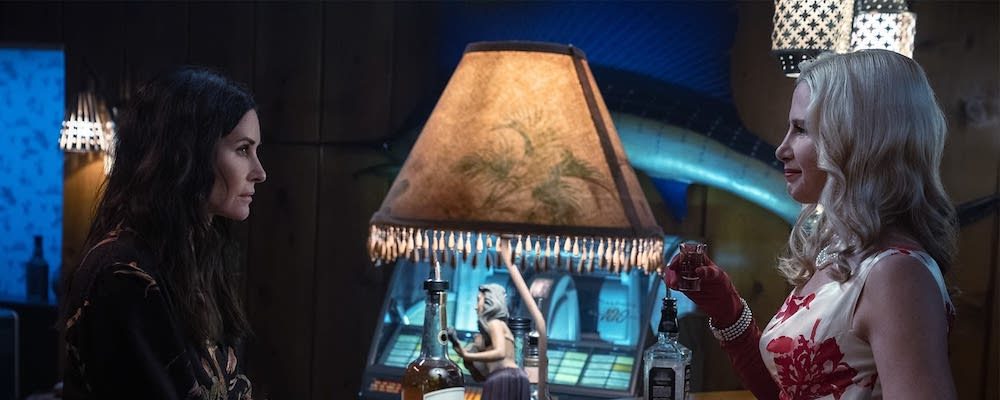In Starz’s ‘Shining Vale,’ Courtney Cox Finds a Ghost Writer Can Make All the Difference
Tony Sokol
The living can be so annoying. They are judgmental, distracting, and ask far too many questions. The dead are the same, but their questions are more impertinent in Starz’s haunted house spin “Shining Vale.” The title of this series is an obvious nod to Stephen King’s “The Shining,” and Courtney Cox’s Patricia Phelps is an author who comes from the Jack Torrance school of writing. But it is Mira Sorvino’s Rosemary who has the most life, and she’s dead.
The Phelps family is a handful. Any self-respecting ghost would want to get away from this group the moment they begin dancing to the high school football cheerleading chant, “be aggressive.” “Shining Vale” opens on the road from Brooklyn to the new family home in Connecticut. Pat has a vision, a young girl in a floral dress chasing a ball onto the highway in front of them. Her husband, Terry (Greg Kinnear), ultimately agrees to check to make sure the family doesn’t have a dead kid under the muffler, but he hems and haws about it. He asks a lot of questions. When Pat alerts him to the first signs of strangeness in the new house, Terry gets into an argument over the name of the room rather than look for the prowler she saw in the window. We are rooting for the ghost before she even shows up.
“Shining Vale” is more than a ghost story, of course. There are very comfortable connections between axes and wood sheds, porn magazines and tree houses, and gin and tonics. There is trauma, death, and reawakening. The haunted house is a character, but also a counselor. “Women are twice as likely as men to suffer from depression,” the opening title card reads. “Women are also twice as likely to be possessed by a demon. The symptoms are the same.” The warning blurs the distinction between mental and spiritual illness, but the series always errs on the side of the spook. The humor is equally subtle. The most overt feature of the series are the jump scares. They make incredible leaps between the payoff and punch line.
Courteney Cox gets the best of both worlds, as Pat gets the worst of it. Cox comes alive when Pat loses control. Greg Kinnear personifies the very concept of a clueless husband in “Shining Vale,” with very strong shades of grey. At one point, Terry gets the handyman (Jonathan Higginbotham), who had sex with Pat instead of fixing a sink, which is the reason the family is moving out of Brooklyn in the first place, to help him move an expensive coffee maker to his car. He devolves over the course of the series into the kind of wilderness loner who might write a manifesto, but comes back in time for the party. While a lot of the overt comedy is forced, as a passive-aggressive comedy unit, Cox and Kinnear are perfectly matched. Their high point being the Toyotathon discussion, which features the rawest, and barely-restrained, acting in the series.
Gus Birney and Dylan Gage play the Phelps kids as contemporary spoofs of clichéd teenagers. Rebellious daughter Gaynor finds a way to accessorize a chastity belt, and loner son Jake can’t tell a virtual spook from the real thing because he’s always wired to something. They have their attitudes down. Unseen by all but Pat, Rosemary was the ideal mother in the generation before “Rosemary’s Baby,” apron on and casseroles on demand. When Rosemary is happy, Pat’s family is happy. Terry gets sex. The kids get warm cobblers.
The first few episodes are neither comedy or horror, and the first real laugh line doesn’t come until episode seven. “Shining Vale” leans into its clichés. Patricia writes trashy novels. Rosemary is a 1950s housewife. Gaynor goes from promiscuous to pious. There is a generational cycle of mother issues. Women’s trauma is demonized or dismissed, and the couple’s therapist (James M. Connor) thinks Pat is crazy. It doesn’t matter if she’s discussing demonic possession or Terry’s temptation over his co-worker Kathryn (Alysia Reiner). “A man gets depressed, and he gets to work through it, but a woman has an emotion and she’s treated like a mental patient,” Pat tells him at a session. He prescribes more Clonazepam.
Like the last season of “American Horror Story,” the cure for writers block comes in pill form, which the series keeps in a chillingly bright dispenser. Pat hasn’t had a drink, or a hit novel, in 17 years. She needs to finish the sequel to her smash erotic romance novel, “Cressida Unbound,” before her publisher drops her. As she descends deeper into paranoia, pharmaceuticals are an easy metaphor. Even the housewives in “The Stepford Wives” couldn’t get through the day if they didn’t get the recipe for mother’s little helpers. Pat’s mother, Joan (Judith Light), couldn’t have gotten out of a five-point hold in the asylum without her lithium.
Visually, the directors have a field day with camera angles, lighting and sets. The house has everything a haunted series wants, from secret stairways to hidden tiki bars, with toys in every room, stained glass windows overlooking a dense property where bodies could easily be hidden. The house is on a busy suburban street, but removed from the neighborhood. Valerie He (Susan Park), who lives next door, is the most intriguing and frightening of the locals, and she’s the one giving out medals of saints for protection.
“Shining Vale” grows more suspenseful as the house wakes up. There are more than metaphors behind “The Yellow Wallpaper.” A growing body count and a neighborhood occult store manager who takes demonic possession seriously bode well for a subtly ghastly ending. If the show steps off the ledge, it will have a satisfying conclusion, most likely a cliffhanger.
“Shining Vale” premieres March 6 and airs Sundays at 10 p.m. ET on Starz.

